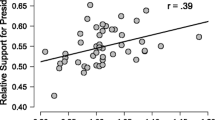Abstract
Despite recent efforts to improve on counterfactual theories of causation, failures to explain how effects depend on their causes are still manifest in a variety of cases. In particular, theories that do a decent job explaining cases of causal preemption have problems accounting for cases of causal intransitivity. Moreover, the increasing complexity of the counterfactual accounts makes it difficult to see why the concept of causation would be such a central part of our cognition. In this paper, I propose an account of our causal thinking that not only explains the hitherto puzzling variety of causal judgments, but also makes it intelligible why we would employ such an elusive concept.
Similar content being viewed by others
Author information
Authors and Affiliations
Corresponding author
Rights and permissions
About this article
Cite this article
Björnsson, G. How Effects Depend on their Causes, Why Causal Transitivity Fails, and Why we Care About Causation. Philos Stud 133, 349–390 (2007). https://doi.org/10.1007/s11098-005-4539-8
Published:
Issue Date:
DOI: https://doi.org/10.1007/s11098-005-4539-8




